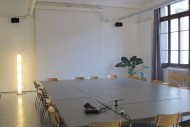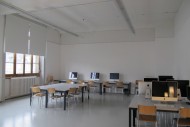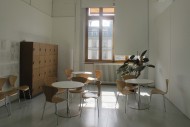aims
pedagogy
Elaborated in an organic conception of research and teaching, the Programme is built around a core of directed studies with a strong intellectual and conceptual foundation and a wide range of research skills for the conception of art projects open to participation and free distribution.
Conceived as a learning community the Programme promotes a participatory, evolutionary and mutually engaged pedagogy that encourages the sharing of resources and competences as well as collaborative dynamics.
cosmopolitan students in a bilingual environment
a research laboratory through the arts
The Research-Based Master Programme is addressed to committed, curious and proactive students. It is open to all – with required diplomas – including candidates from the sciences, humanities, politics, economics, polytechnics, law, art and various interdisciplinary practices. It welcomes applications from individuals who will contribute to its diversity.
The official working languages of the Programme are French and English. Each student has the right to express him or herself, orally or in written format, in one of these two languages. A solid basis in the other language is recommended. English is the common language of the cosmopolitan student body.
The CCC Programme promotes research through art rather than referencing the “art scene”. It transforms the conception of art practices and develops independent information through the study of critical sources and means. The program explores the role of art in society and considers artistic practice as knowledge production, thus promoting an approach that challenges traditional genres and the limits of the gallery/museum context.
research fields
situated art practices
The CCC Research-Based Master Programme founds its practices on political thought, postcolonial and gender theories, hybrid forms of distribution, and the art of networks and Internet culture. It develops research on Identity Micropolitics, Cross-Cultural Studies, Critical Economy, Political Ecology, Critical Theory, Subcultures, Cyberculture and Cybermedia, the Arts of the Contact Zone, Radical Pedagogy, Interventionist Art Practices and Tactical Media, European Syntax, Cosmopolitics, and the Politics of Reconciliation.
Studio investigations and artistic research are realized through the media of technical reproduction as well as through experimental formats and new genres. Art practice is situated, embedded in the historical, social and personal. It comes out of everyday life in specific environmental and political contexts. Art practice is discursive, part of a given society’s representation regime – life style, way of life, institutions, texts. It is interventionist, politically engaged and transdisciplinary. The Programme defends art engaged with the public sphere or civil society, conceived as the scene (the site) of discussion and deliberation and as a midfield between private space and institutions.







